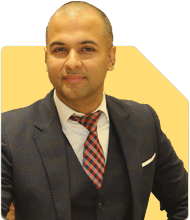Harsh Bharwani | Answer |Ask -Follow
Entrepreneurship Expert - Answered on Oct 19, 2023
As CEO and managing director, he leads the international business and employability initiatives at the computer networking institute, Jetking Infotrain Limited.
After graduating from Delhi University, Bharwani joined the family business in 2010 and set up operations in the US and Vietnam.
He has trained over three lakh students in employability, confidence and key life skills.... more

I have been trying to scale my Digital Marketing and Advertising Agency since 2 years. but i am still not able to touch 1 lakh a month consistently. I know where i am going wrong, its the sales mostly. Please suggest me a way off how to a get a proper sales channel to get clients , how to manage funds for sales channels, and maybe some channels you can suggest.?
Ecommerce
Ecommerce is any transaction that is completed online. For example, when you buy clothes from your favorite online store, that is ecommerce. Every time you order food from a delivery app like Doordash or Postmates, that is also e-commerce. Ecommerce is a huge market, worth over $5 trillion, and it’s expected to make up 24.5% of global sales by 2025.
Pros:
Lower startup costs, since you won’t have to pay for a physical storefront.
Can sell internationally and 24/7, as long as your website is active.
You can collect customer data to help you figure out what your target market wants.
Cons:
Problems in your distribution channel may cause the end of customer relationships.
Might have higher return rates because customers can’t try before buying products.
Direct sales in brick-and-mortar stores is still more popular despite ecommerce’s rising popularity.
Traditional marketplaces
Amazon, Etsy, eBay, Walmart Marketplace, and Google Shopping are examples of traditional marketplaces. These channels feature a wide range of product offerings and, for the most part, customers search by the product they’d like to buy rather than the brand they’d like to purchase it from.
While traditional marketplaces come with a preexisting customer base, these platforms require you to give up control of customer service and fulfillment speeds, and to compete on margins.
Pros:
You get your products in front of the existing customer base of those marketplaces.
You can use their distributors and marketing channels already in place.
Being part of a traditional marketplace can give you legitimacy in the eyes of your target market.
Cons:
Indirect sales mean you have to pay a commission for every sale made using a traditional marketplace, and those commissions can change.
Marketplaces can have really strict terms and conditions for how you communicate and represent yourself in their stores.
There might be a lot of different brands selling similar products in these stores, so it may be hard to find a way to stand out.
Modern marketplaces
Modern marketplaces are content-driven platforms that enable commerce. This includes social media channels like Instagram, TikTok, Facebook, and Pinterest. It also includes places like Spotify. One of the reasons these modern marketplaces are so successful as sales channels is because buyers are already there. Adding a Buy button allows you to meet buyers where they are.
Pros:
There are apps that can help you track various metrics on your social media platforms to help you optimize your posts and reach.
You can collaborate with other brands and influencers to cross-sell and cross promote.
Most social media platforms have useful templates you can use for your ads and store.
Customer support can be instantaneous on social media.
Cons:
You constantly need to create content to stay visible.
You need to be vigilant against any negative feedback or trolls.
If a social media site goes down or your account is hacked that could really affect your business.
Retail
The retail channel includes both permanent and pop-up shops, like a short-term rental in a mall, a booth at a craft fair, or a stall at a local farmers market. Retail channels provide the opportunity for you to build relationships with your customers in person and get real-time feedback. Retail is a powerful piece of the modern commerce playbook.
Pros:
You get face-to-face contact with your customers
Cut out the middlemen and get products straight into the hands of your customers.
The sales process is direct and ends with you having payment in hand at the end of the sale.
Cons:
May have added cost of hiring sales team (sales reps, sales manager, customer support team).
Can be expensive paying for overhead on brick-and-mortar shop.
Dealing with interpersonal issues with staff and customers.
Wholesale
Wholesale involves selling your products to other businesses who then retail them. Some businesses choose to make wholesale their only sales channel; others use wholesaling as one leg of an omnichannel sales strategy. Wholesale is a great way to move a lot of inventory at once.
You may like to see similar questions and answers below
Maxim Emmanuel | Answer |Ask -Follow
Soft Skills Trainer - Answered on Mar 26, 2024
Ramalingam Kalirajan |10905 Answers |Ask -Follow
Mutual Funds, Financial Planning Expert - Answered on Apr 08, 2024
Ramalingam Kalirajan |10905 Answers |Ask -Follow
Mutual Funds, Financial Planning Expert - Answered on Dec 19, 2025
Ramalingam Kalirajan |10905 Answers |Ask -Follow
Mutual Funds, Financial Planning Expert - Answered on Dec 19, 2025
Ramalingam Kalirajan |10905 Answers |Ask -Follow
Mutual Funds, Financial Planning Expert - Answered on Dec 19, 2025
Radheshyam Zanwar |6751 Answers |Ask -Follow
MHT-CET, IIT-JEE, NEET-UG Expert - Answered on Dec 19, 2025
Radheshyam Zanwar |6751 Answers |Ask -Follow
MHT-CET, IIT-JEE, NEET-UG Expert - Answered on Dec 19, 2025
Samraat Jadhav |2514 Answers |Ask -Follow
Stock Market Expert - Answered on Dec 18, 2025
Reetika Sharma |432 Answers |Ask -Follow
Financial Planner, MF and Insurance Expert - Answered on Dec 18, 2025
Reetika Sharma |432 Answers |Ask -Follow
Financial Planner, MF and Insurance Expert - Answered on Dec 18, 2025
Reetika Sharma |432 Answers |Ask -Follow
Financial Planner, MF and Insurance Expert - Answered on Dec 18, 2025
Samraat Jadhav |2514 Answers |Ask -Follow
Stock Market Expert - Answered on Dec 18, 2025























